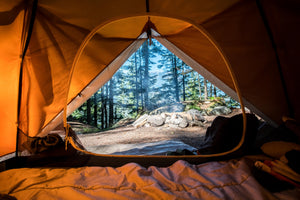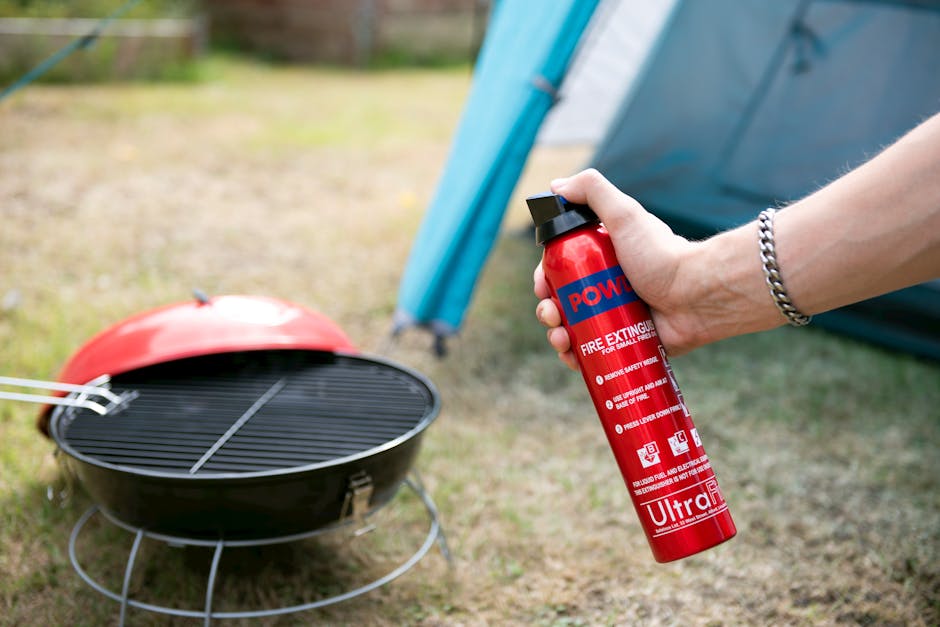Have you ever wondered if raccoons can attack your tent while you’re camping outdoors? If you’re planning a trip into the wild, this question might be on your mind.
After all, no one wants to wake up to a surprise visitor rummaging through their gear or worse, causing damage to their shelter. Understanding how raccoons behave around tents can save you from stress and keep your camping experience safe and enjoyable.
Keep reading to discover the truth about raccoons and your tent, and learn simple steps to protect yourself during your next outdoor adventure.

Credit: www.baysports.com.au
Raccoon Behavior Near Campsites
Raccoons are common animals near camping areas. They look for food and shelter close to people.
Understanding raccoon behavior helps campers stay safe and protect their tents.
Raccoon Activity Patterns
Raccoons are mostly active at night. They sleep during the day to avoid heat and humans.
They move quietly and use their strong sense of smell to find food near campsites.
Attraction To Campsites
Campsites attract raccoons because of easy food sources. Leftover snacks and trash are common draws.
Raccoons also like tents if they smell food or if the tent is not closed properly.
- Open food containers
- Unsecured trash bags
- Pet food left outside
- Coolers with food smells
Signs Of Raccoon Presence
You can spot raccoons by their tracks and noises near your campsite. They leave clear signs.
Raccoons often leave scratches on trees or tents and may knock over items while searching for food.
- Footprints in dirt or mud
- Scratches on tent fabric or trees
- Scattered trash or food wrappers
- Rustling sounds at night
Raccoons And Tent Interactions
Camping outdoors means sharing space with wildlife. Raccoons are common near campsites. They often come close to tents during the night.
People wonder if raccoons attack tents and what causes these encounters. Understanding their behavior helps campers protect their gear.
Why Raccoons Approach Tents
Raccoons are curious animals. They explore tents looking for food or shelter. The smell of food inside tents attracts them most.
They may also be drawn by bright lights or movements. Sometimes tents offer a safe place to hide from predators or bad weather.
- Food smells from coolers or bags
- Warmth and shelter from the tent
- Bright lights or shiny objects
- Noise or movements inside the tent
Frequency Of Tent Attacks
Raccoon attacks on tents are rare. They mostly want food, not to harm people or tents. Most encounters are harmless and brief.
When attacks happen, they usually mean the raccoon is desperate for food. Camping in raccoon areas requires some care to avoid problems.
- Attacks are uncommon but possible
- Raccoons mostly search for food
- Damage happens if food is inside the tent
- Proper storage lowers attack chances
Common Tent Damage Causes
Tents can get damaged by raccoons in a few ways. They use sharp claws and teeth to reach food inside. This causes rips and holes.
Sometimes raccoons pull on tent zippers or fabric. They want to open the tent to get snacks. This can break zippers and tear mesh screens.
- Ripping fabric to reach food
- Chewing tent zippers and seams
- Tearing mesh windows or doors
- Leaving dirt and paw prints inside
Preventing Raccoon Encounters
Raccoons are curious animals that can come near campsites looking for food. They may try to get into tents if they smell food inside. It is important to take steps to avoid attracting raccoons to your tent.
By using smart food storage and keeping your camp clean, you can reduce the chances of raccoons approaching your campsite. Setting up your tent safely also helps keep you and your gear safe from unwanted visitors.
Proper Food Storage Techniques
Keep all food in sealed containers that raccoons cannot open. Use hard plastic or metal boxes instead of plastic bags. Store food away from your tent, at least 100 feet if possible.
- Use bear-proof containers or hang food from a tree
- Do not keep food inside the tent
- Clean containers before storing them to remove food smells
Camp Cleanliness Tips
Keep your campsite clean to avoid attracting raccoons. Pick up trash and food scraps right away. Use designated trash bins or pack out your garbage completely.
- Wash dishes immediately after use
- Do not leave food or trash on picnic tables or ground
- Store trash in sealed bags or containers until disposal
Safe Tent Setup Practices
Set up your tent away from food preparation and storage areas. Avoid cooking or eating inside your tent. This reduces smells that attract raccoons.
- Keep your tent zipped closed at all times
- Check your tent for holes or openings before sleeping
- Store gear inside the tent to keep it safe

Credit: paddlerco-op.ca
Responding To Raccoon Encounters
Camping outdoors can bring you close to wildlife. Raccoons are common visitors near campsites. They usually do not attack tents but can be curious and cause trouble.
Knowing how to respond to raccoon encounters helps keep you safe and protects your gear. Stay calm and follow simple steps to handle these situations.
How To React Safely
If a raccoon approaches your tent, do not panic or run. Sudden moves may scare the animal and cause it to act defensively.
Speak in a firm voice and slowly back away. Avoid direct eye contact, which might be seen as a threat. Give the raccoon space to leave.
- Stay calm and do not shout
- Back away slowly without turning your back
- Keep food sealed and away from your tent
- Do not try to touch or feed the raccoon
Deterrents And Repellents
There are safe ways to keep raccoons away from your campsite. Use items that create noise or light to scare them off.
Natural repellents, like vinegar or ammonia-soaked cloths, can help keep raccoons at a distance. Avoid using harmful chemicals that can hurt animals or the environment.
- Use a bright flashlight or headlamp to deter raccoons
- Hang noisy objects, such as wind chimes or cans
- Place vinegar or ammonia-soaked cloths near your tent
- Store food in raccoon-proof containers or coolers
When To Seek Help
Contact park rangers or wildlife officials if raccoons act aggressively or seem sick. Do not try to handle injured or rabid animals yourself.
Seek medical attention if you get bitten or scratched by a raccoon. Raccoons can carry diseases that need prompt treatment.
- Report aggressive raccoons to park staff
- Do not approach or touch raccoons that look sick
- Get medical care for any raccoon bites or scratches
- Follow local guidelines for wildlife encounters
Additional Wildlife Safety Tips
Camping outdoors means sharing space with wildlife. Knowing how to stay safe helps you enjoy your trip. This guide offers tips beyond just raccoon safety.
Wild animals can be curious or protective. Learning about other nocturnal animals and preparing well can keep you safe.
Managing Other Nocturnal Animals
Animals like skunks, owls, and foxes are active at night near campsites. They usually avoid people but can be attracted by food or bright lights.
Keep your campsite clean and store food in sealed containers. Avoid shining bright lights into animal eyes. Make noise if you need to move around at night.
- Store food away from sleeping areas
- Use sealed containers to avoid smells
- Keep trash in animal-proof bins
- Make quiet noises to alert animals
- Do not feed wildlife under any condition
Emergency Preparedness
Be ready for unexpected wildlife encounters or injuries. Having a plan helps you act calmly and quickly.
Carry a first aid kit and know how to use it. Have a whistle or other loud noise maker to scare animals if needed.
- Keep a first aid kit accessible
- Carry a flashlight with extra batteries
- Have a whistle or air horn for emergencies
- Know the nearest help location
- Share your camping plan with someone
Camping Gear Recommendations
Choosing the right gear can protect you from wildlife. Good tents and storage tools reduce risks at night.
Use tents with strong zippers and no holes. Bring bear-proof food containers or hang food high in trees. Use animal repellent sprays if allowed.
- Use tents with secure zippers
- Check tents for holes before use
- Store food in bear-proof containers
- Hang food at least 10 feet off ground
- Carry animal-safe repellent sprays

Credit: www.reddit.com
Frequently Asked Questions
Do Raccoons Frequently Invade Camping Tents?
Raccoons are curious creatures and may approach tents if they smell food. However, they rarely attack. Ensure all food is stored securely. Using airtight containers can help deter them. Campers should remain vigilant and clean up any food scraps. Proper precautions can minimize raccoon encounters.
How Can I Keep Raccoons Away From My Tent?
To deter raccoons, store food in sealed containers away from your tent. Avoid leaving any food scraps around your campsite. Hanging food in trees can also help. Keep your campsite clean and free from scents that might attract raccoons. This reduces the chance of an encounter.
Are Raccoons Aggressive Towards Campers?
Raccoons are generally not aggressive towards humans unless threatened. They are more interested in scavenging for food. If you encounter a raccoon, remain calm and give it space. Avoid making sudden movements. Most raccoons will retreat if they don’t feel threatened.
Respecting their space ensures safety.
What Attracts Raccoons To Campsites?
Raccoons are drawn to food scents and leftovers. They have a keen sense of smell and are opportunistic feeders. Campers should store all food securely and dispose of trash properly. Keeping campsites clean will reduce the attraction for raccoons. Proper food handling practices are crucial for prevention.
Conclusion
Raccoons can be curious but rarely attack tents. They mainly search for food, not people. Keep food sealed and away from your tent. This helps avoid unwanted visits at night. Stay calm if you see a raccoon nearby. Most encounters end without trouble.
Enjoy your camping trip with simple safety steps. Nature is fun and safe with smart choices.

